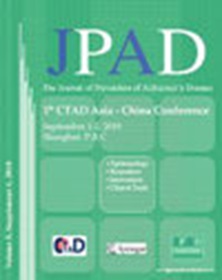The Association between Sugar-Sweetened Beverages and Cognitive Function in Middle-Aged and Older People: A Meta-Analysis
IF 8.5
3区 医学
Q1 CLINICAL NEUROLOGY
引用次数: 3
Abstract
To explore the association between the intake of sugar-sweetened beverages and cognitive dysfunction in middle-aged and older adults, so as to provide an evidence-based basis for the early prevention of cognitive dysfunction. A comprehensive search of relevant literature was conducted in PubMed, EMBase, Cochrane, ScienceDirect, and Web of Science from the inception until January 2021. Odds ratios (OR), hazard ratios (HR) and 95% confidence intervals (CI) were calculated using a random-effects, generic inverse variance method. Meta-analysis of the included studies was performed using Review Manager 5.4. A total of 10 studies on the association between sugary beverages and cognitive dysfunction in middle-aged and older adults were included, of which 3 were cross-sectional studies and the rest were cohort studies. Eight of the ten studies had results suggestive of a negative association. However, Meta-analysis results showed that the association between the intake of sugar-sweetened beverages and the risk of cognitive impairment was not statistically significant (OR=1.59, 95% CI: 0.93–2.74, P=0.08); but from two studies, the hazard ratios of all-cause dementia in middle-aged and older people consuming sugar-sweetened beverages was 2.77 (95%CI: 2.24–3.43, P<0.00001); the hazard ratios of Alzheimer’s disease in middle-aged and older people consuming sugar-sweetened beverages was 2.63 (95%CI: 1.70–4.05, P<0.0001). There is insufficient evidence to state conclusively that sugar-sweetened beverages intake causes cognitive dysfunction in middle-aged and older adults.含糖饮料与中老年人认知功能的关系:一项meta分析
探讨中老年人含糖饮料摄入与认知功能障碍的关系,为早期预防认知功能障碍提供循证依据。在PubMed, EMBase, Cochrane, ScienceDirect和Web of Science中进行了从成立到2021年1月的相关文献的全面检索。比值比(OR)、风险比(HR)和95%置信区间(CI)采用随机效应、通用逆方差法计算。使用Review Manager 5.4对纳入的研究进行meta分析。共纳入10项关于含糖饮料与中老年人认知功能障碍关系的研究,其中3项为横断面研究,其余为队列研究。10项研究中有8项的结果表明两者之间存在负相关。然而,meta分析结果显示,摄入含糖饮料与认知障碍风险之间的相关性无统计学意义(OR=1.59, 95% CI: 0.93-2.74, P=0.08);但从两项研究来看,饮用含糖饮料的中老年人患全因痴呆的风险比为2.77 (95%CI: 2.24-3.43, P<0.00001);饮用含糖饮料的中老年人患阿尔茨海默病的风险比为2.63 (95%CI: 1.70-4.05, P<0.0001)。目前还没有足够的证据表明,含糖饮料的摄入会导致中老年人的认知功能障碍。
本文章由计算机程序翻译,如有差异,请以英文原文为准。
求助全文
约1分钟内获得全文
求助全文
来源期刊

Jpad-Journal of Prevention of Alzheimers Disease
CLINICAL NEUROLOGY-
自引率
7.80%
发文量
85
期刊介绍:
The JPAD « Journal of Prevention of Alzheimer’Disease » will publish reviews, original research articles and short reports to improve our knowledge in the field of Alzheimer prevention including : neurosciences, biomarkers, imaging, epidemiology, public health, physical cognitive exercise, nutrition, risk and protective factors, drug development, trials design, and heath economic outcomes.
JPAD will publish also the meeting abstracts from Clinical Trial on Alzheimer Disease (CTAD) and will be distributed both in paper and online version worldwide.
 求助内容:
求助内容: 应助结果提醒方式:
应助结果提醒方式:


